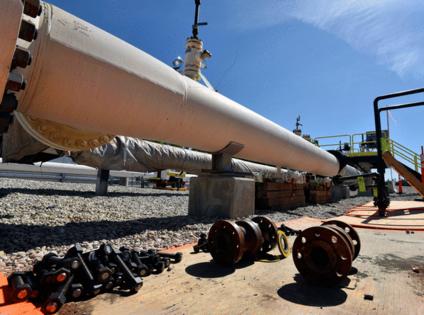Trump administration wades into Michigan's Line 5 oil pipeline dispute
Published in Business News
LANSING, Michigan — President Donald Trump's administration has waded into the future of Enbridge Inc.'s controversial Line 5 oil pipeline, arguing the state of Michigan should not be able to undermine the federal government's authority over pipelines and energy supplies.
The Department of Justice filed a statement of interest last week in federal court that argues that the U.S. has both energy and foreign affairs concerns that would be negatively impacted by Gov. Gretchen Whitmer's and Attorney General Dana Nessel's efforts to shut down the pipeline stretching across the bottomlands of the Straits of Mackinac.
“The federal government already comprehensively regulates pipeline safety, but Michigan is trying to usurp the Department of Transportation's statutory authority,” Adam Gustafson, acting assistant attorney general of the DOJ's Environment and Natural Resources Division, said in a statement Friday.
“President Trump has made clear that the United States will not tolerate state overreach that interferes with American energy dominance.”
The pipeline, which carries natural gas liquids and light crude oil, originates in Alberta before traveling through Wisconsin into the Upper Peninsula, down through the Straits of Mackinac and the Lower Peninsula and then into Ontario.
The more than 70-year-old pipeline, particularly the segment crossing through the nexus of Lakes Huron and Michigan, has been a source of concern since a major oil spill in 2010 on a separate Enbridge pipeline in the Kalamazoo River in the Marshall area.
In 2018, after a boat anchor strike on Line 5 earlier in the year, departing Republican Gov. Rick Snyder entered an agreement with Enbridge to build a tunnel under the Straits that would house a new segment of Line 5.
Nessel and Whitmer, who entered their offices in 2019, had campaigned on promises to shutter the line and filed lawsuits in 2019 and 2020, respectively, seeking to revoke Enbridge's easement through the Straits and shut the line down.
In 2021, the government of Canada invoked a never-before-used 1977 treaty between the U.S. and its neighbors to the north that protected transit pipelines crossing both countries. Treaty negotiations are ongoing.
Currently, there are two lawsuits still alive regarding the efforts to close the line. One filed by Nessel in 2019 is awaiting a state circuit judge's decision and also has an Enbridge appeal being considered in the U.S. Supreme Court. Another filed by Enbridge against Whitmer is awaiting a hearing in federal court in Grand Rapids.
The Department of Justice's filing was made in the federal case and joins other third-party filings by Michigan tribes, business groups, the government of Canada and several Democratic-led states, including Minnesota, Wisconsin, New York and Delaware.
U.S. District Judge Robert J. Jonker is scheduled to hear arguments on a motion to stay and a motion for summary judgment in the federal case on Nov. 12 in Grand Rapids.
In its Sept. 12 filing, the U.S. Department of Justice argued the Pipeline Safety Act expressly preempts Whitmer's decision to revoke Enbridge's easement and reserves the right to make decisions on pipeline operations to the Pipeline and Hazardous Materials Safety Administration.
The effort to sidestep the Pipeline Safety Act creates "an unworkable patchwork of state standards for interstate pipelines," the DOJ wrote.
It also impedes foreign relations and the ongoing treaty negotiations between the U.S. and Canada, the filing said.
"Michigan’s attempt to globalize its regulatory reach by shutting down Line 5 runs afoul of that interest and provides another reason to resolve this case in favor of Enbridge, according to the Foreign Affairs Doctrine," the Trump DOJ wrote.
Democratic former President Joe Biden's administration also weighed in on Line 5 litigation last year, albeit in a different state, Wisconsin, where the pipeline also faces threats of closure. The Department of Justice, in that case, argued a federal judge did not fully consider U.S.-Canadian treaty obligations governing oil pipelines when he ordered Enbridge in 2023 to remove or shut down its pipeline on Native American lands in Wisconsin.
In the state case seeking the closure of Line 5, an Ingham County Circuit judge has waited months to issue a definitive ruling on whether or not the state should prevail in its efforts to close the line. Separately, the U.S. Supreme Court is considering arguments regarding whether the case should be heard in federal court, not state.
Separately on Friday, the Michigan Supreme Court said it will hear oral arguments on suits brought by tribal nations and environmental advocates that challenge state regulators' approval of permits for the Line 5 tunnel beneath the Straits of Mackinac. A date for those arguments has not yet been set.
“The (Michigan Public Service) Commission approved this project without a true consideration of its impacts or an analysis of whether Michiganders need it, but one thing is clear: The heart of the Great Lakes is simply no place for an oil pipeline tunnel,” said Adam Ratchenski, an attorney for Earthjustice, which is representing several Michigan tribes in the suit.
©2025 www.detroitnews.com. Visit at detroitnews.com. Distributed by Tribune Content Agency, LLC.












Comments